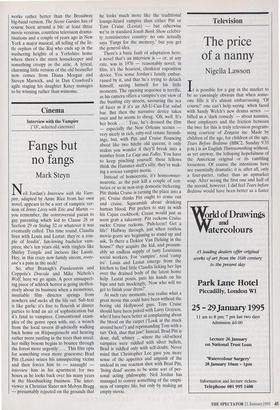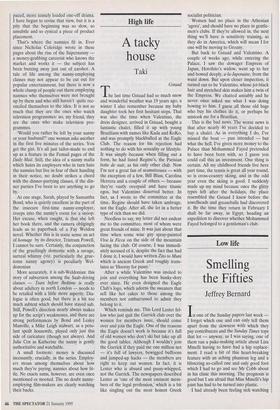Television
The price of a nanny
Nigella Lawson
It is possible for a gap in the market to be so yawningly obvious that when some- one fills it it's almost embarrassing. 'Of course!' one can't help saying when faced with Sandy Welch's new drama series billed as a 'dark comedy' — about nannies, their employers and the friction between the two: for this is truly television program- ming courtesy of Zeitgeist inc. Made by children of the age, for children of the age, Tears Before Bedtime (BBC2, Sunday 9.35 p.m.) is an English Thirtysomething without, as yet anyway, the lolloping hopefulness of the American original or its rambling looseness. Of course the intentions here are essentially dramatic; it is, after all, only a four-parter, rather than an upmarket soap. After seeing the first one and half of the second, however, I did feel Tears before Bedtime would have been better as a faster paced, more tensely loaded one-off drama. I have begun to revise that view, but it is a pity that the beginning was so slow, so unsubtle and so cynical a piece of product placement.
That's where the nannies fit in. Ever since Nicholas Coleridge wrote in these pages about the rise of the Supernanny a money-grubbing careerist who knows the market and works it — the subject has been buzzing away just out of earshot. A tale of life among the nanny-employing classes may not appear to be cut out for popular entertainment, but there is now a whole clump of people out there employing nannies who themselves were not brought up by them and who still haven't quite rec- onciled themselves to the idea. It is not so much that they are the ones who watch television programmes: no, my friend, they are the ones who make television pro- grammes.
`Would you rather be left by your nanny or your husband?' one woman asks another in the first five minutes of the series. You get the gist. It's all just tailor-made to end up as a feature in the Femail pages of the Daily Mail. Still, the idea of a nanny mafia which hates its employers who in turn hate the nannies but live in fear of their handing in their notice, no doubt strikes a chord with the dinner-partying classes, if the din- ner parties I've been to are anything to go by.
At one stage, Sarah, played by Samantha Bond, who is quietly excellent in the part of the insecure first-time nanny-employer, creeps into the nanny's room for a snoop. Her excuse, when caught, is that she left her book there, and the camera obligingly leads us to paperback of a Fay Weldon novel. Whether this is in some sense an act of homage by its director, Tristram Powell, I cannot be sure. Certainly, the conjunction of the gruellingly domestic with a savage, surreal whimsy (viz. particularly the grue- some nanny agency) is peculiarly Wel- dononian More accurately, it is sub-Weldonian: this story of subversion among the Saab-driving classes — Tears before Bedtime is really about adultery in north London — needs to be retailed with a little more asperity. Dia- logue is often good, but there is a bit too much subtext which should have stayed sub. Still, Powell's direction nearly always makes up for the script's weaknesses, and there are strong performances by Bond and Lesley Manville, a Mike Leigh stalwart, as a petu- lant spoilt housewife, played only just this side of caricature (though not always). And Julie Cox as Katherine the nanny is gently authoritative and watchable.
A small footnote: money is discussed incessantly, crucially, in the series. Employ- ers moan among themselves about how much they're paying; nannies about how lit- tle. No exacts sums, however, are even once mentioned or mooted. The no doubt nanny- employing film-makers are clearly watching their backs.



























































 Previous page
Previous page